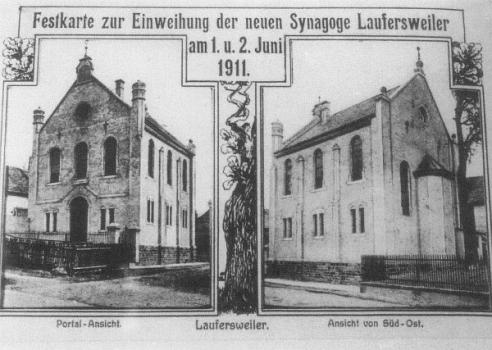
The first synagogue in Laufersweiler was most likely built prior to 1825, but fell victim to a major fire and burned to the ground. A new structure was built on today’s “Kirchgasse” in 1844, with its floor plan revealing features typical of many rural synagogues. The building had a Mikveh and a teacher’s apartment, but also served as a cattle shed and a barn. When this synagogue was closed by the Prussian authorities after it had fallen into disrepair, a new synagogue was built in 1911 that was more stately and large enough to facilitate one of the largest Jewish communities in the region: 156 members out of a population of 799 (1895).
The synagogue’s interior furnishings were completely destroyed during the November pogroms of 1938, with not one of the sacral objects surviving. The building was not set on fire, however, due to concerns for the surrounding buildings.
The civil community purchased the building in 1955, mounted a suspended ceiling in place of the women’s gallery and installed a freezing unit as well as laundry facilities on the ground floor. The upper floor served as a school room and later as a hall for public venues.
The building was placed under protection as a historical monument in 1985 following controversial discussions, with the exterior being largely restored to its original appearance. The “Förderkreis Synagoge Laufersweiler e.V.” sponsoring group has used the building since 1989 as a site to promote understanding between peoples and tolerance, and founded the „Forst-Mayer Studien- und Begegnungszentrum für das Landjudentum“ (Forst-Mayer Centre for Study and Encounter related to Rural Jewish Life) in 2014. The former synagogue is part of an overall ensemble of remembrance that includes the permanent exhibition „Sie gehörten zu uns“ („They were part of us“), a commemoration site featuring artistic compositions, the “Pathway of Remembrance” and the “Pathway of Jewish Poetry”, as well as the Jewish Cemetery.
Photo documentation: “Forst-Mayer Studien- und Begegnungszentrum für das Landjudentum” (Forst-Mayer Centre for Study and Encounter related to Rural Jewish Life)
